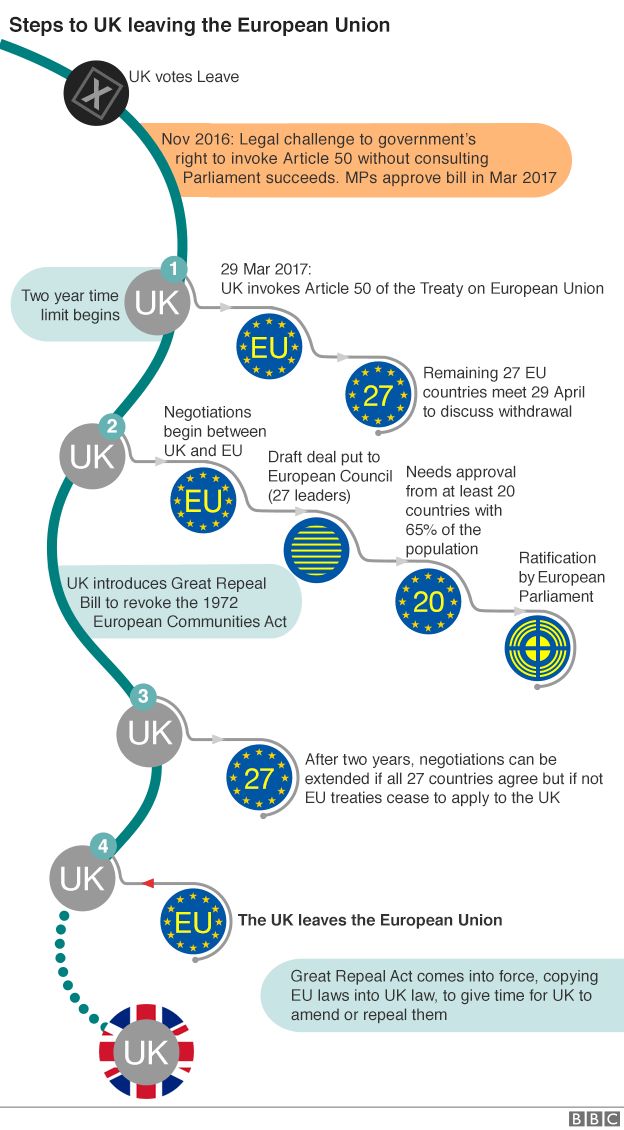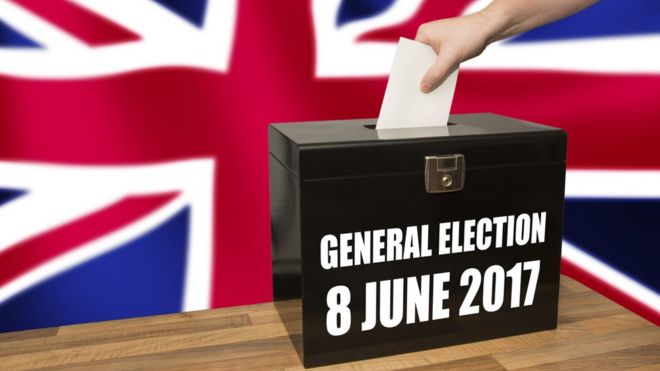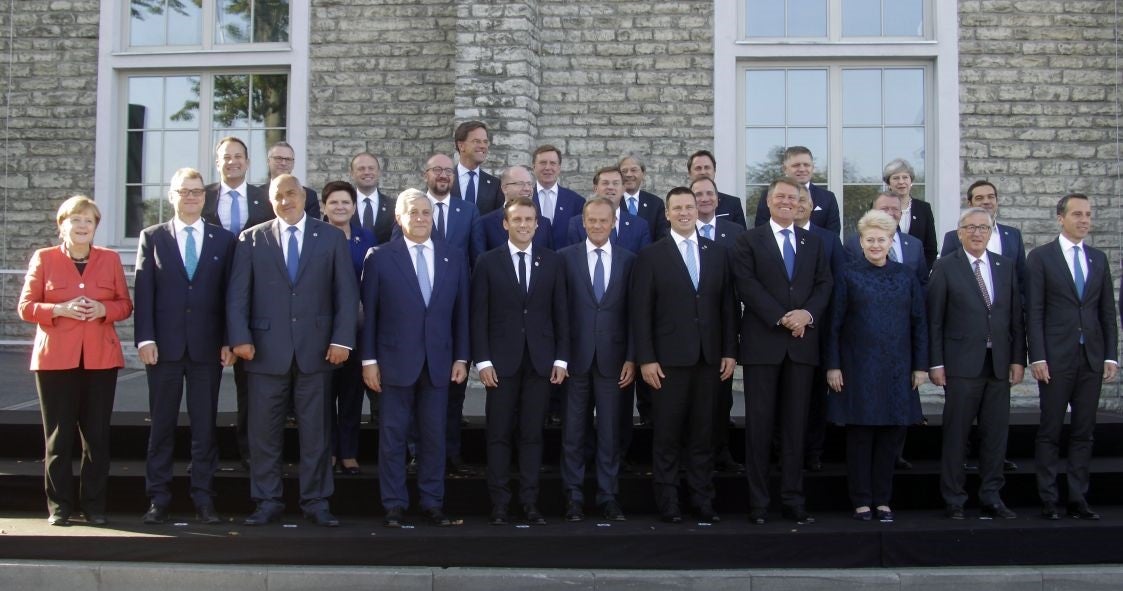“Will Brexit even happen?” is one of the biggest questions that has been circulating in British Politics. Not “what will the economic/trade policies be?” or “what will Brexit mean for the non-British Europeans currently living in the UK?” but “will it happen?”. These questions are not unfounded as throughout the proceedings of Brexit negotiations, there has been a lot of back and forth that has made people question whether or not Brexit will actually occur. There have been many unseen events that have happened in the meantime that shift where the UK is on the negotiation timeline. These issues have mainly emerged from the general election on Thursday, June 8th, 2017,
in which Theresa May, a conservative member of Parliament and the British Prime Minister, lost a number of seats in parliament to the opposing party, the Labor party. But despite all of the push backs and delays, Theresa May told Parliament that important progress was made towards the enacting of Brexit at the EU Florence Summit.
During the negotiations over Brexit, there have been a number of different possible scenarios that could play out to determine the future relationship between the UK and the EU. These outcomes have been basically categorized into the groups of ‘hard Brexit’ and ‘soft Brexit’. In the beginning of her time as Prime Minister, May expressed that she supported a hard Brexit. An example of her support can be seen in a quote from one of her speeches in fall of 2016, "Let me be clear," said May "We are not leaving the European Union only to give up control of immigration again. And we are not leaving only to return to the jurisdiction of the European Court of Justice” (May 2016).
A hard Brexit or clean Brexit would be the most radical option and is the option that is usually associated with the Conservative Party. This would entail leaving the EU with no ties, and most likely with no trade deal in place. The United Kingdom would make their own trade deals, and have full control over their borders. Instead of trading in the EU’s single market, the UK would have to create their own trade agreements. Because the UK would no longer be following the trade rules set in place by the EU, what is expected to happen is that the UK would then abide by the rules of the World Trade Organization (WTO). A soft Brexit would mean that the UK will keep their relationship with the EU as close as possible to the previous arrangements. Although the UK would no longer be a member or have a seat on the EU council, the UK would most likely have access to the EU’s single market and have a degree of free movement within the EU. Some examples of other countries that have deals like this are Norway and Iceland who are not members of the EU but have access to the single market.
The General Election resulted in a hung parliament, a result that May had not seen coming. She held the election under the premise that she needed the government to be ‘strong and stable’, but many people have speculated that the real reason for calling forth the election so early was because she saw a political opportunity as the polls were down for her biggest competitor, the Labour party. Having more liberals in parliament results in the current conflict of Brexit- will the UK move forward to work on trade negotiations with the EU right now, or will the UK instead have a second vote on whether or not the UK should leave the EU, or in short, if Brexit should actually happen. According to the timeline of Article 50 of the Lisbon Treaty, the UK should be only focusing on making trade deals with the remaining countries in the EU right now. However, as a result of the general election, Theresa May called on June 8th this past summer, there are now many more representative of the Labour Party that are instead shifting the Parliament’s focus to a re-vote on Brexit itself. This debate over how Brexit should happen is directly seen as Theresa May gave her speech at the EU Summit in Florence on September 22nd, 2017.
On Friday, September 22 Theresa May, gave her long-awaited speech in Florence, which has since been since dubbed the Florence Speech. In her speech, May covered several points. One topic she discussed was that there would be about a two year transition period in which trade and justice relations would stick to the “status quo”, including paying the membership fees. May also talked about not disregarding or kicking out the non-British Europeans out of the UK.
Reassuring them that, “all EU citizens who have made their lives in [the UK] – we want you to stay; we value you; and we thank you for your contribution to our national life – and it has been, and remains, one of my first goals in this negotiation to ensure that you can carry on living your lives as before” (May 2017). This sentiment also carried further as May talked about UK courts continuing to take the decisions of EU courts into consideration. May also spoke on economic and trade policy. Stating that while they are leaving the European Union’s single market, they are hoping to create “a new framework that allows for a close economic partnership,” but understand with leaving the single market the UK will have to take on new obligations and that there will be new trade balances (May 2017). She also spoke of creating a new framework not merely adopting a framework that is already in use, such as the trade deal that the EU has with Canada, but instead one that reflects the wishes of the British people. May’s most important point and a point that she reiterated over and over again was the UK wants to have good relations with the EU and that they wish, “to be [the EU’s] strongest friend and partner as the EU, and the UK thrive side by side” (May 2017). As they “may be leaving the European Union, but [they] are not leaving Europe” (May 2017).
Despite what many at the time of the Brexit vote wished for, it is apparent from May’s speech that the UK is no longer heading in the direction of a hard Brexit. In fact, it’s heading in the opposite direction and leaning towards a soft Brexit. One point of hers’ that made this leaning apparent was when she talked about UK courts continuing to consider the rulings of the EU courts. Another point that was leaning towards a soft Brexit was when she talked about letting non-British Europeans stay in the UK, and having them “carry on [their] lives as before” (May 2017). The most telling point that was for soft Brexit was her constant insistence that the UK and the EU would keep tight ties and a strong partnership despite the UK leaving the EU.
There are a few main points that Theresa May has been pushing since she got back from the EU Summit where she gave her Florence Speech. The first point that she stresses during her speeches is that the United Kingdom will leave the European Union. She is persistent on that point. May continuously uses the word “confident” when referring to this situation in regards to the referendum happening. From the words she delivered in front of parliament on Wednesday, October 25th, “We are in negotiations with the EU but I am confident the timetable under the Lisbon Treaty does give time until March 2019 for the negotiations to take place. But I am confident because it is in the interests of both side - and it is to just this parliament that wants to have a vote on that deal but actually there will be ratification by other parliaments - that we will be able to achieve agreement in that negotiation in time for this parliament to have the vote we committed to” (May 2017).
This leads into the next point that needs to be highlighted that Theresa May is stressing, that Parliament WILL be sticking to the vote of leaving the EU and that the negotiations to move forward towards the next step in Article 50 WILL be achieved by the two-year time limit of March 2019. Other points she discussed during her speech to parliament on Monday, October 23rd concerning the trade deal included that the UK does want to keep its ties with the EU for trade deal purposes, talking about how the UK will be a prominent trade partner of the EU. Theresa May also commented that the UK has, “made important progress moving towards the new deep and special partnership with the European Union that we wanted to see” (May 2017). There were many big-ticket ideas discussed at the Summit besides from the Brexit negotiations she that brought up at Parliament after her Florence Speech that could be talked about and focused on as well, but one that has great relevance are her comments on that the UK will not be abandoning Europe even though they are leaving the EU.
 So where does this put us on the timeline? Behind. Because of the general elections Theresa May held in the summer, there is now a more equal divide in Parliament and the
So where does this put us on the timeline? Behind. Because of the general elections Theresa May held in the summer, there is now a more equal divide in Parliament and the
Sources
Baker, A. (2017, June 22). Hard or soft Brexit? The six scenarios for Britain. Retrieved October 27, 2017, from Financial Times website: https://www.ft.com/content/52fb4998-573f-11e7-9fed-c19e2700005f
Brexit: What are the options? (2017, June 12). BBC News. Retrieved from http://www.bbc.com/news/uk-politics-37507129
EU-Canada (CENTA). (n.d.). Retrieved October 27, 2017, from European Commission website: http://ec.europa.eu/trade/policy/in-focus/ceta/
Euro Summit. (n.d.). Retrieved October 27, 2017, from European Council Council of the European Union website: http://www.consilium.europa.eu/en/european-council/euro-summit/
The European Single Market. (n.d.). Retrieved October 27, 2017, from European Commission website: https://ec.europa.eu/growth/single-market_en
Hung Parliament. (n.d.). Retrieved October 27, 2017, from UK Parliament website: http://www.parliament.uk/about/how/elections-and-voting/general/hung-parliament/
Iceland. (n.d.). Retrieved October 27, 2017, from European Commission website: http://ec.europa.eu/trade/policy/countries-and-regions/countries/iceland/
May, T. (2017, October 2). Theresa May - her full Brexit speech to Conservative conference. Independent. Retrieved from http://www.independent.co.uk/news/uk/politics/theresa-may-conference-speech-article-50-brexit-eu-a7341926.html
May, T. (2017, October 23). Theresa May: We are going to leave the European Union in March 2019 – video. The Guardian. Retrieved from https://www.theguardian.com/politics/video/2017/oct/23/theresa-may-we-are-going-to-leave-the-european-union-in-march-2019-video
May, T. (2017, October 23). Brexit: Theresa May says 'important progress' made at EU summit. BBC News. Retrieved from http://www.bbc.com/news/uk-politics-41720244
May, T. (2017, September 22). Theresa May’s Florence speech on Brexit, full text. The Spectator. Retrieved from https://blogs.spectator.co.uk/2017/09/theresa-mays-brexit-speech-full-text/
Norway. (n.d.). Retrieved October 27, 2017, from European Commission website: http://ec.europa.eu/trade/policy/countries-and-regions/countries/norway/
Peck, T. (2017, April 28). Remaining 27 EU countries agree Brexit guidelines as Hollande says UK must 'pay price'. Independent. Retrieved from http://www.independent.co.uk/news/uk/politics/remaining-27-eu-countries-agree-brexit-guidelines-as-hollande-says-uk-must-pay-price-a7709016.html
World Trade Organization. (n.d.). Retrieved October 27, 2017, from World Trade Organization website: https://www.wto.org/


No comments:
Post a Comment